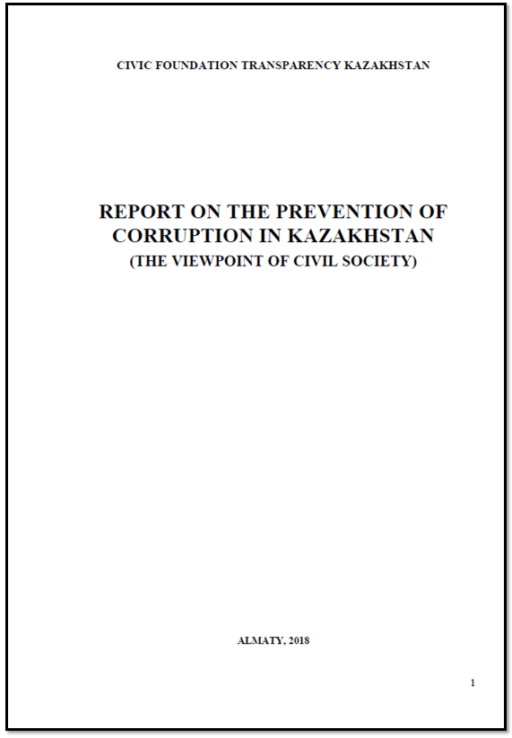Preventing Corruption in Kazakhstan
Description
This purpose of this report is to show the situation with corruption through the eyes of the general public, experts and non-governmental organisations. It does not attempt to disprove the national report, but aims to supplement it and offers its own recommendations for the fight against corruption.
Objectives
- discussing the current status of the fight against corruption in Kazakhstan
- analysing important aspects of the fight against corruption for society and experts
- developing recommendation for the fight against corruption
Summary
Since 2015, Kazakhstan has witnessed a new stage in the fight against corruption, one which changes the priority from reacting to corruption to preventing it, and which has impacted the entire state governance system. The government has already introduced a new law to fight corruption and a specialised state programme for the same until 2025. At the same time, the process to prevent corruption actively engages civil society in the form of political parties and non-governmental organisations. In addition, Kazakhstan has played an active role in the same issue with the UN, OECD and other organisation and initiatives that have the fight against corruption as their goal.
The report sets out in detail all of the above aspects of the fight against corruption, both as it is today and potential changes to it. It takes a look at Kazakhstan civil society’s thoughts on the fight against corruption and the viewpoint of the international organisations on the same. Special attention has been paid to the issues that exist and the rights of individuals who come up against corruption.
Key findings
- The state is not united in fighting corruption, and that there is internal opposition to the progressive policy being developed by the Agency for Civil Service Affairs and the Prevention of Corruption. At the same time as the required effective solutions are being taken, a lot of decisions are also being made that actually hinder the fight against corruption.
- A significant problem is the imbalance in the branches of power, specifically the clear domination of the executive branch of power over the legislative branch. This has a real impact on decisions being made, which may be a result of ulterior corporate or sector lobbying, which actually manages to harm society as a whole.
- Nevertheless, the state has the challenge, forms and tools to participate in, like society and the general public itself, the fight against corruption. Many examples exist of how interaction in this area can be successful. For example, the general public and non-governmental organisations can counter corruption at the system level, amending laws and other normative legal acts.
- As every year passes, Kazakhstan society, as shown by sociological surveys, is becoming more and more willing to participate in the fight against corruption. However, due to low levels of legal literacy and a visible lack of trust in new tools of interaction between the public and the state, it is yet to meet its full potential.
- On the whole, it is worth pointing out that in the last two years we have seen some progress in the fight against corruption, specifically in society becoming a participant in the process.
Recommendations
- Improve access to judicial information, which requires the development of the adequate regulation of access to judicial information, including a mechanism for analysing and comparing examples of court resolutions.
- Improve the legislative branch of power, which involves parliament creating its own expert centre, transferring the Accounts Committee to parliamentary control and establishing ties with public councils. At a regional level, the staff headcount of maslikhat offices needs to be expanded to improve the opportunities available to deputies.
- Improve state governance, which would require regulating the entire state asset sphere by simplifying and publishing reporting, developing governance strategies and highlighting concealed reserves. In addition, transparency in the economy also needs to be improved through openness in land use and the implementation of anti-corruption reviews for draft laws.
- Engage civil society. The mass engagement of civil society in the fight against corruption is only possible once a critical mass of people has been created that is aware of its rights. For that reason, the public needs educating in the principles of legal knowledge while still at school and then in how to make use of the “Electronic Government” and “Open Government” services.
Authors
Civic Foundation Transparency Kazakhstan
Date
14/11/2018
Tags
 Download PDF
Download PDF
